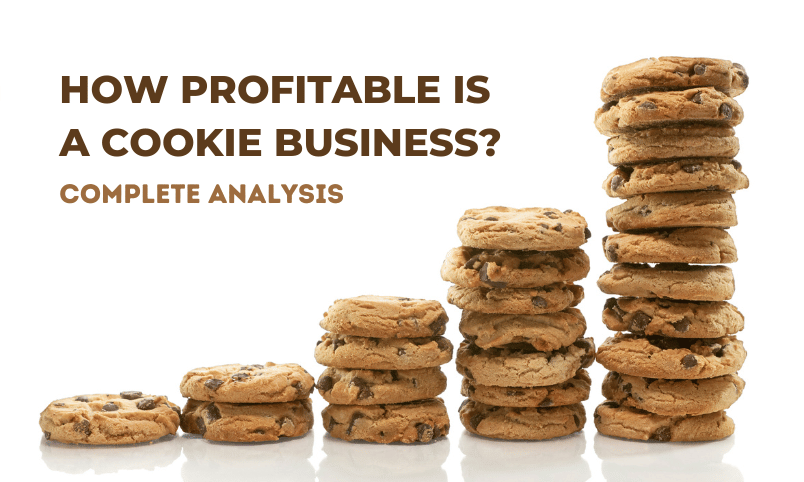By Esabda
Are you a baking enthusiast who dreams of turning your passion into a profitable venture? Starting a cookie business might be the perfect opportunity for you. Not only can it provide a creative outlet, but it also has the potential to generate substantial profits. In this article, we will explore the ins and outs of running a cookie business and shed light on how profitable is actually a cookie business.
Baking cookies has been a joyous hobby for countless people, but in recent times, the cookie business has taken off like a rocket! With the growing love for homemade and artisanal goodies, cookie entrepreneurs are in high demand. Whether you’re dreaming of selling your scrumptious treats at bustling farmers’ markets, reaching cookie enthusiasts on online platforms, or even opening a cozy brick-and-mortar store, there are a few key ingredients to mix into the batter of your success and ensure your cookie adventure turns out to be a delightfully profitable one!
What is a Cookie Business?
A cookie business involves the production and sale of delicious, freshly baked cookies. From classic chocolate chip cookies to unique flavor combinations and dietary-specific offerings, the possibilities are endless. With consumers seeking high-quality, handcrafted treats, a cookie business can tap into this market demand and carve out a niche for itself.
Also Read: How to Start a Bakery Business from Home | Complete Guide
How Profitable is a Cookie Business?
Starting a cookie business can be a profitable endeavor if approached with careful planning and execution. The profitability of a cookie business depends on various factors such as market demand, pricing strategy, operational efficiency, and effective marketing. While specific earnings can vary based on individual circumstances, let’s explore some key insights and data-driven information to provide a general understanding of the potential profitability.
Investment Cost
The initial investment required to start a cookie business can vary depending on the scale of operations and location. A home-based cookie business may require a smaller investment compared to a commercial bakery or storefront. Here is a breakdown of some common investment costs:
- Equipment and Supplies: This includes baking equipment (mixers, ovens, utensils), packaging materials, ingredients, and any specialized tools. The cost can range from a few hundred to several thousand dollars, depending on the quality and quantity of equipment needed.
- Licenses and Permits: To operate legally, you may need to obtain licenses and permits, such as a food handler’s permit or a business license. The cost of these permits can vary based on your location and regulatory requirements.
- Branding and Marketing: Developing a strong brand identity and marketing your cookie business effectively is crucial. This may involve creating a professional logo, designing packaging, building a website, and implementing marketing strategies. Costs can vary depending on the extent of branding and marketing efforts undertaken.
- Space Rental: If you choose to have a physical storefront or commercial kitchen, rental costs will be a significant consideration. Lease rates can vary widely based on the location and size of the space.
It’s important to create a detailed business plan and budget to estimate the investment costs accurately for your specific cookie business.
Average Earnings
The average earnings of a cookie business can be influenced by various factors, including location, target market, product quality, pricing, and marketing effectiveness. While specific earnings will vary, let’s explore some data-driven insights to provide a general understanding:
- Market Demand: Assessing the demand for homemade or artisanal cookies in your target market is crucial. Research local competitors, analyze consumer preferences, and identify any gaps or untapped niches. A strong market demand increases the potential for higher earnings.
- Pricing Strategy: Setting the right prices for your cookies is essential for profitability. Consider factors such as ingredient costs, production expenses, packaging, and your target market’s purchasing power. Conduct a competitive analysis to ensure your prices are competitive while maintaining a healthy profit margin.
- Sales Channels: The choice of sales channels can impact earnings. Selling through multiple channels, such as online platforms, local farmers’ markets, wholesale to other businesses, and potentially having a physical storefront, can increase revenue streams and reach a broader customer base.
- Operational Efficiency: Streamlining production processes, managing costs effectively, and minimizing waste can contribute to improved profitability. Implementing systems to track inventory, optimize ingredient usage, and increase production efficiency can positively impact earnings.
While specific earnings are difficult to determine without analyzing individual circumstances, successful cookie businesses have reported significant profits. With dedication, strategic planning, and a focus on quality and customer satisfaction, it is not uncommon for a cookie business to achieve annual earnings ranging from $50,000 to $100,000 or even more.
Remember, these figures are approximate and can vary significantly based on factors such as location, competition, market conditions, and the effort invested in the business.
It’s important to conduct thorough market research, develop a strong brand, establish effective marketing strategies, and continuously evaluate and adapt your business operations to maximize profitability.
Overall, a cookie business has the potential to be a profitable venture for passionate bakers willing to invest time, effort, and resources into creating delicious cookies that cater to market demand.
Also Read: 20 Profitable Baking Business Ideas
Factors Affecting Profitability of Cookie Business
Several factors influence the profitability of a cookie business. Firstly, identifying your target market and understanding their preferences is crucial. Conduct market research to gain insights into consumer tastes, trends, and demands.

1. Finding Your Niche
To stand out in a competitive market, it’s essential to find your niche. Consider offering specialty cookies like gluten-free, vegan, or organic options to cater to a specific customer segment. By focusing on a niche market, you can differentiate your cookie business and attract loyal customers who value your unique offerings.
2. Setting Up Your Cookie Business
Before launching your cookie business, you’ll need to address several logistical aspects. This includes acquiring the required licenses and permits, locating ingredients, setting up a production facility, and making sure that health and safety requirements are followed. Building a solid foundation will position you for success and open the door to a successful business.
3. Marketing Strategies for Success
Effective marketing is vital to the success of any business, including a cookie business. Develop a comprehensive marketing strategy that incorporates both online and offline channels. To raise brand awareness and draw customers, use social media platforms, produce interesting content, work with influencers, and take part in regional events.
Also Read: 100 Effective Small Business Marketing Ideas
4. Pricing Your Cookies
Determining the right pricing for your cookies is crucial for profitability. Consider factors such as ingredient costs, production expenses, packaging, and your target market’s purchasing power. Conduct a competitive analysis to understand the pricing landscape and ensure that your prices are competitive while maintaining a healthy profit margin.
5. Managing Costs and Expenses
To maximize profitability, it’s essential to manage costs and expenses efficiently. Carefully monitor and control your ingredient costs, packaging expenses, and overhead costs. Seek opportunities to negotiate better deals with suppliers, explore bulk purchasing options, and streamline your production processes to reduce waste and optimize efficiency. By keeping a close eye on your expenses, you can increase your bottom line and improve the profitability of your cookie business.
6. Scaling Your Cookie Business
Once your cookie business starts gaining traction, you may consider scaling up operations to meet growing demand. This can involve expanding your production capacity, hiring additional staff, or even opening multiple locations. However, it’s crucial to approach scaling strategically. Conduct a thorough analysis of market trends, assess financial feasibility, and ensure that your operations can handle the increased volume without compromising on quality.
7. Building Customer Loyalty
Building a loyal customer base is key to long-term profitability. Focus on delivering exceptional customer service, creating a memorable brand experience, and consistently delivering high-quality cookies. Implement a loyalty program to reward repeat customers and encourage referrals. By nurturing strong relationships with your customers, you can foster loyalty and secure a steady stream of business.
8. Online Platforms for Expanding Reach
In today’s digital age, leveraging online platforms is essential for expanding the reach of your cookie business. Establish an e-commerce website to sell your cookies directly to customers nationwide or even internationally. Explore partnerships with food delivery apps or online marketplaces to increase your visibility. By tapping into the online market, you can access a larger customer base and drive higher sales.
9. The Importance of Quality and Presentation
In the cookie business, quality and presentation are paramount. Ensure that you use high-quality ingredients, pay attention to detail in your baking process, and consistently deliver delicious cookies. Invest in attractive packaging that reflects your brand and creates an enticing visual appeal. Remember, customers not only crave great taste but also appreciate visually appealing products that make their experience even more enjoyable.
10. Tracking and Analyzing Performance
To continuously improve the profitability of your cookie business, it’s essential to track and analyze key performance metrics. Monitor sales data, customer feedback, and website analytics to gain insights into consumer preferences, identify trends, and make data-driven decisions. Regularly evaluate your marketing strategies, product offerings, and operational efficiency to stay ahead of the competition and optimize profitability.
Also Read: 600+ Bakery Business Name Ideas
How much can you expect to earn from a cookie business?
The earnings from a cookie business can vary depending on several factors such as the scale of operations, market demand, pricing strategy, and operational efficiency. On average, successful cookie businesses have reported annual earnings ranging from $50,000 to $100,000 or even more. However, it’s important to note that individual earnings can vary significantly based on various circumstances.
To make your cookie business more profitable and maximize your earnings, there are a few key strategies to consider. First and foremost, understanding your target market and identifying a unique selling proposition can help you stand out from the competition. By offering specialty cookies, experimenting with unique flavors, or catering to specific dietary preferences (such as gluten-free or vegan options), you can tap into niche markets and attract a dedicated customer base willing to pay a premium for your products.
In Conclusion
Starting a cookie business, when executed right, can be a wonderfully profitable venture for baking enthusiasts. By understanding the market, finding your niche, implementing effective marketing strategies, managing costs, and prioritizing customer satisfaction, you can whip up a recipe for success that fills both your pockets and the hearts of cookie lovers.
Remember, in this delectable realm, where sugar and dreams intertwine, the possibilities are endless for those who mix their passion with the right ingredients and bake their way to sweet triumph!
Frequently Asked Questions (FAQs)
While professional baking experience can be helpful, it is not always necessary to start a successful cookie business. Passion for baking, creativity, and a willingness to learn can go a long way. You can also consider taking baking courses or seeking guidance from experienced bakers.
To differentiate your cookie business, focus on unique flavors, specialty offerings, exceptional customer service, and appealing packaging. Finding a niche market and delivering a memorable brand experience can help you stand out from the competition.
No, it is not necessary to have a physical store for a cookie business. Many successful cookie businesses operate entirely online or through pop-up shops, farmers’ markets, or collaborations with existing establishments. An online presence can be a cost-effective way to reach a wider audience and expand your customer base.
Also Read:
- How to Start a Permanent Jewelry Business | Complete Guide
- 600+ Jewelry Business Name Ideas
- How to Start a Crystal Business | Complete Guide
- Top 10 Freebies Ideas for Small Business




